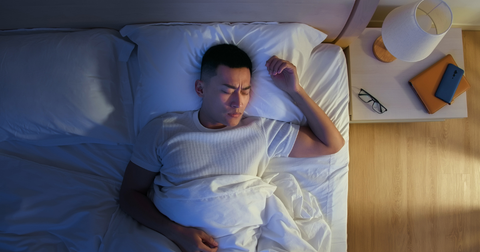Sleep is such a pivotal part of routine that a lack of it can render you irritable, moody, and unfocused. It can also weaken your immune system and make you more susceptible to illness. If you’re having trouble stabilizing your sleep cycle, it could be an indication that something is awry. If getting better rest is on your agenda, and you’re currently investigating possible reasons for scanty z’s, here are some (seemingly inconspicuous) symptoms that may mean more than you think.
You are alarm dependent
Could be: an underactive thyroid, or a latent infection
The fact is that we need 7-9 hours of sleep on average to feel refreshed. Feeling the need to sleep more than that on the daily could indicate an underlying condition such as hypothyroidism, where sleeping more than that on purpose can increase the risk of dysfunctional thyroid. With studies showing overlap in hypothyroidism and hyperthyroidism with sleep conditions like insomnia, restless leg syndrome and obstructive sleep apnea, this one is important to keep an eye on. If you’re sleeping more than 10 hours daily, it may be time to test your thyroid’s ability to regulate your metabolism. Oversleeping could also be due to latent infection (like the common cold or flu), in which case, the lengthy sleeps will likely be short-lived.
You wake up tired
Could be: sleep apnea or low mood
Sleep inertia is the impaired cognition we experience between sleep and wake, and it is a natural part of the human condition. This becomes abnormal, however, when you’ve gotten enough hours in but still can’t seem to shake sleepiness. This could be an indication of sleep apnea, a breathing problem that disrupts the restful sleep of an estimated 5.4M diagnosed Canadians a year. In adults, the most common cause of sleep apnea is the obstruction of the soft tissue of the throat while asleep, causing breathing to start and stop repeatedly. This may cause you to wake several times in a night (though you may only recall one or two). If you think this might be you, try sleeping on your back to see if you feel better rested in the morning. If that doesn’t work, we suggest checking in with your doctor as this can develop into something pretty serious. Another reason you may be feeling sleepy after sleeping is low mood or general feelings of sadness, which work in tandem with sleep disruption. If you’re feeling sleepless after an adequate amount of rest, it may be worth scheduling some time with a therapist.
You wake up with a dry mouth and throat
Could be: a secret snorer
We hate to be the one to tell you, but you might a snorer. For context, snoring is caused by an obstruction of the tongue in the back of the throat. While some may look at this condition as a simple nuisance, its impacts are resounding. Not only does it disrupt your sleep and leave you feeling restless, but it’s often a very good sign that you may also be suffering from obstructive sleep apnea. OSA occurs when your upper airway is partly or mostly blocked while you sleep. This sends your diaphragm and chest muscles into overdrive, shortening your breath and limiting your brain’s access to oxygen. These not only contribute to high blood pressure but can cause heart failures or atrial fibrillation (irregular heartbeat) that can onset stroke or heart failure. So, when it comes to your symptoms, not only is snoring related to mouth breathing (which can leave you with a dry mouth and throat), but constant vibration in your airways is a common cause of sore throats. If you’re feeling concerned, talk with your doctor to get the bottom of this and see what solutions are available to you.
You need to watch something to fall asleep
Could be: underlying feelings of overwhelm
If YouTube has become your lullaby, it may just be part of your nighttime ritual. It may also be an active distraction from what’s going on upstairs. The quiet of night leaves a lot of space for untended thoughts, often bringing background problems into the foreground. Having something else playing helps to deflect those thoughts and quiet the worries you may not be acknowledging in the bustle of the day. What you may not realize is that the screen light actually increases our stress hormones, making it more challenging to calm down and get some rest. If this sounds like you, try swapping the screens for meditation or lecture tonight and see if you notice improved sleep quality in the morning. Journaling may help, as well.
You wake up and can’t get back to sleep
Could be: Restless Leg Syndrome
If you stretch before bed and still wake up kicking, you may be experiencing Restless Leg Syndrome. Stemming from a fluctuation in dopamine levels, this cycle usually begins in the early evening and hits a peak in the middle of the night when you’re shaken awake from sleep. Similarly to sleep apnea, it has been linked to heart conditions like heart attacks and strokes. The good news is that this can be treated, and you can get back to a healthy rest cycle soon. If you think this may be you, contact your doctor for a consultation.
Getting to sleep and staying asleep can be challenging for the best of us. If you’re looking for something to help you achieve restfulness, supplements can help. Have a look at our wide range of naturals solutions for better sleep here.

Citations
-
Singh, A, MD & Pacheco, D. (2022, March 11). Could your thyroid be causing sleep problems? Sleep Foundation. Retrieved March 23, 2022, from https://www.sleepfoundation.org/physical-health/thyroid-issues-and-sleep
-
Song, L., Lei, J., Jiang, K., Lei, Y., Tang, Y., Zhu, J., Li, Z., & Tang, H. (2019, December 19). The association between subclinical hypothyroidism and sleep quality: A population-based study. Risk management and healthcare policy. Retrieved March 23, 2022, from https://www.ncbi.nlm.nih.gov/pmc/articles/PMC6927586/
- Green, M. E., Bernet, V., & Cheung, J. (2021, August 24). Thyroid dysfunction and sleep disorders. Frontiers in endocrinology. Retrieved March 23, 2022, from https://www.ncbi.nlm.nih.gov/pmc/articles/PMC8423342/




